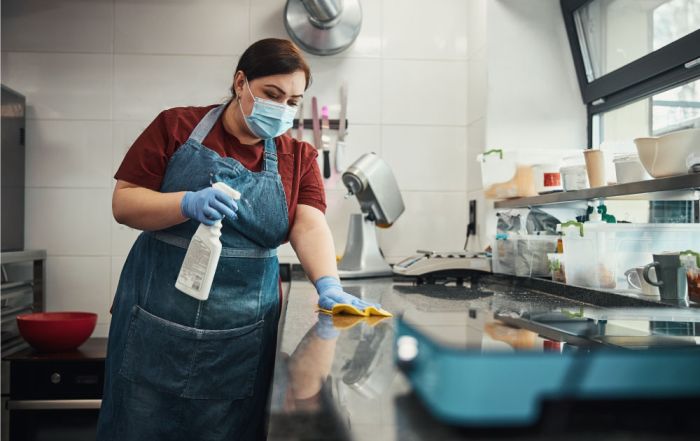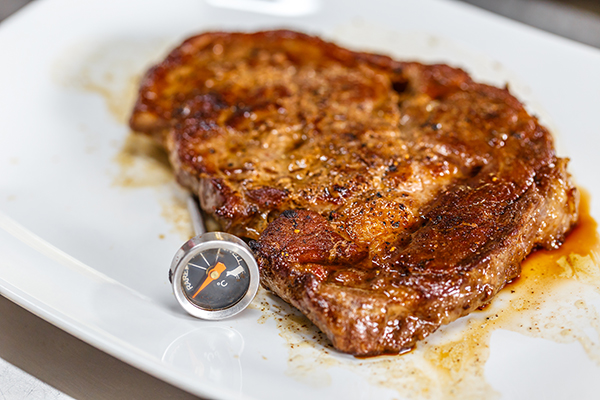Finding the Food Safety Training Program that is Right for You
… if my business were ever the source of a foodborne illness outbreak, I would certainly want to know that I had done everything in my power to protect my guests and having trained my employees who work on the front lines with the food I serve in my business would be the very least that I could do.
However, I don’t know about you, but if my business were ever the source of a foodborne illness outbreak, I would certainly want to know that I had done everything in my power to protect my guests and having trained my employees who work on the front lines with the food I serve in my business would be the very least that I could do. Thus, below is a list of all organizations who are currently certified to offer the food safety certification exam and some basic information about the program. Accredited Food Manager Examinations[1]
| Name of Organization | Website | Format | Cost | Other Notes |
|---|---|---|---|---|
| AAA Food Safety | https://aaafoodhandler.com/food-manager-certification | Training: Online Exam: Remote proctoring | Training & Exam: $99.95 Exam only: $69.95 Training Only: $49.95 | The $99.95 rate only provides one attempt to pass the exam. There is a “Diamond Package” available for $119.95 that provides one free retreat. |
| WFSO Academy | https://academy.worldfoodsafety.org/#/fpm | Training: Online Exam: Remote or in-person at test site | Exam, remote proctoring: $95.00 Exam, in-person at test site: $125.00 Training: $12 – $95.00 | Study courses are priced individually but can also be purchased in a comprehensive bundle. Access to the course is available for one year. |
| Certus / StateFoodSafety.com | https://www.statefoodsafety.com/ | Training: online Exam: In-person or online, remote proctoring available | Training & Exam: $78.00[2] + proctor fee (varies, usually around $50) Training only: $65.00 Exam only: $28.00 plus proctor fee (varies, usually around $50) | If you fail the exam, you must repurchase a new exam, however the course remains free. Examinee must repurchase the exam and register for an exam session for each attempted retake. |
| 360training.com, Inc. | https://www.360training.com/learn2serve | Training: Online Exam: Remote proctoring, cost included with both the training and exam package and the exam only option. | Training & Exam: $121.00 Exam only: $69.99 | Students allowed two attempts to pass the exam with no additional cost. Not approved for New York City |
| My Food Service License | https://myfoodservicelicense.com/ | Training: Online Exam: Remote proctoring. | Training & Exam: $199.00 Exam only: $100.00 Training only: $161.00 | Normal prices are reported. At the time of the audit, the training and exam were “on sale” for $169.00 and the training only was $115.00. |
| National Registry of Food Safety Professionals | https://www.nrfsp.com/ | Training: It appears this is designed for in-person training, but self-study options are allowed. There is an affiliate network that provides online training for an additional cost. Exam: Online or in-person | Training & Exam: $70.95 Self-Study Training Materials: $23.00-$103.95 Exam only: $80.00 | Of accredited programs, this was the most complicated of the websites to navigate in order to determine what you needed to purchase to obtain the certification. |
| National Restaurant Association | https://www.servsafe.com/ | Training: In-person or online Exam: In-person or online, remote proctoring available. | Training & Exam: In-person costs will vary; online $179.00 Exam only with online proctoring: $99.00 Online Exam Voucher only: $36.00 | If you fail the exam, you must repurchase a new exam, however the course remains free. |
| Trust20 | https://trust20.co/ | Training: Online, remote proctored. Exam: Online | Training: $90.00 Exam only: $90.00 | If you fail the exam, you must repurchase a new exam. The training is available, but only results in a “certificate”, not certification. There does not appear to be a combined training/exam package with a reduced rate. |
| Responsible Training | https://www.responsibletraining.com/ | Training: Online, remote proctored by Examity. Exam: Online | Training & Exam: $119.99 Exam only: $64.99 | Students allowed two attempts to pass the exam with no additional cost. |
| The Always Food Safe Company, LLC | https://alwaysfoodsafe.com/en/ | Training: Online Exam: Remote proctoring, cost included with both the training and exam package and the exam only option. | Training & Exam: $78.00 + Remote Proctor Fee of $48.00 Exam only: $28.00 + Remote Proctor Fee of $48.00 | Students allowed two attempts to pass the exam with no additional cost. |
[1] Information is current as of 9/26/2023 [2] Fee is specific to the state and, in some cases, the county. It appears that most are $78.00.
READ MORE POSTS
Welcome to National Food Safety Education Month!
In September of each year, we not only have the opportunity to celebrate Labor Day, but we also welcome National Food Safety Education Month! It is this time of the year when it is important to remember that Foodborne illnesses are still a major concern in the United States, although I am guessing many Americans don’t think about the safety of the food they eat as they go throughout their daily lives. The statistics show one in every six Americans will suffer from a foodborne illness each year, for a total of about 48 million cases each year.
Protecting Fresh Produce Post-Harvest, Integral to Safe Food
During the height of the summer, at least in the Midwest, farmers markets are in full swing and fresh produce is plentiful. Every backyard gardener is reaping the benefits of their work, with bountiful harvests of tomatoes and cucumbers. Everyone seems to have a neighbor who is trying to pawn off his or her over-production of cucumbers or summer squash during this time of year. When picking up that produce at the farmer’s market or from your neighbor down the street, have you ever given any thought to the microbial safety of it? Honestly, even in my position, it certainly is NOT the first thing that comes to my mind. But, earlier this month, I came across a news story out of Wisconsin discussing a Salmonella outbreak associated with shelled peas sold at a local farmers market. Who would have thought shelled peas would be impacted? The story noted, and it served as a great reminder, that most outbreaks associated with Salmonella in produce are due to mistakes made in handling or transportation of produce after harvesting.
Properly Cleaning and Sanitizing: The Right Chemical Mix to Maintain Ultimate Effectiveness
A few weeks ago, my family and I had the pleasure of setting sail on a cruise vacation. It is truly one of the only ways that I find that I am able to unplug from work and relax for a small spell. However, as I walked around the ship in our post-COVID world, I couldn’t help but admire all the extra cleaning steps the staff were undertaking to keep us all as safe as possible while in the middle of the ocean with 3,000 other vacationers. All of this cleaning and sanitizing had me thinking about how we each clean and sanitize our own operations and which chemicals we chose to use.
Proper Cooking Temperature: A Basic Food Safety Measure
Each summer, we see an increase in the incidence of foodborne illnesses. Perhaps this is because of the warmer temperatures making temperature control for Time/Temperature Control for Safety (TCS) food more difficult or perhaps it is the increased amount of people who are barbequing this time of year – it is National Picnic Month, after all!










